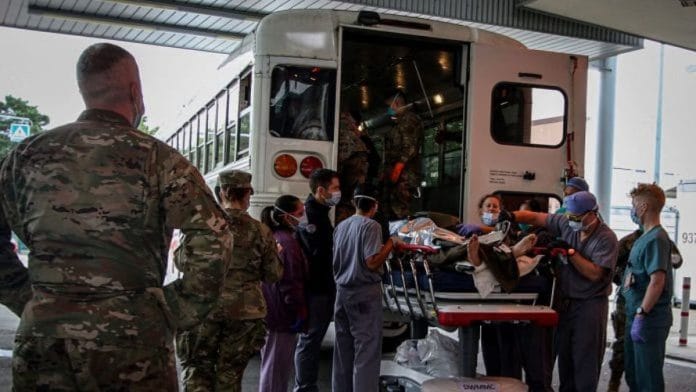New Delhi: Mohammed Sharifullah, the alleged mastermind of the deadly Abbey Gate bombing in Kabul in 2021, has confessed to being behind at least two other bombings before the FBI, according to the US indictment against him.
The US has accused Sharifullah of being an Islamic State of Khorasan (ISIS-K) operative and planning and coordinating the Abbey Gate bombing outside the Kabul International Airport. The 2021 attack killed 13 US service members and roughly 170 Afghan citizens, emerging as a symbol of the chaos of the US withdrawal from Afghanistan in the early months of the Biden administration.
The indictment against Sharifullah was unsealed Wednesday after his 2 March extradition to the US from Pakistan, where he was arrested last month based on Central Intelligence Agency (CIA) inputs. Sharifullah, the indictment revealed, was also behind the 2016 bombing outside the Canadian embassy in Kabul and the 2024 bombing of a concert hall near Russia’s Moscow.
According to the US Department of Justice-released documents, dated 5 March, he “admitted to helping prepare for the Abbey Gate attack, including scouting a route near the airport for an attacker”, during his interrogation by FBI special agents on 2 March, the day he was arrested by the US authorities after landing on US soil.
“Sharifullah specifically checked for law enforcement and American or Taliban checkpoints; he then communicated to other ISIS-K members that he believed the route was clear and that the attacker would not be detected,” the press release said.
Before the FBI, he also allegedly admitted to recognising the Kabul airport suicide bomber, ISIS-K member Abdul Rahman al-Logari, as an operative he knew.
US President Donald Trump, during his address to Congress Tuesday night, thanked Pakistan for acting on CIA intelligence.
“I am pleased to announce that we have just apprehended the top terrorist responsible for that atrocity, and he is right now on his way here to face the swift sword of American justice,” Trump said, thanking the Pakistani government for its help to arrest Sharifullah.
FBI Director Kash Patel wrote on X that Sharifullah’s arrest is “one step closer to justice for these American heroes and families.”
“ISIS-K brazenly claimed responsibility for the carnage. Now thanks to the assistance of the FBI, Department of Justice, and the CIA, we have secured Sharifullah’s apprehension and transport to the U.S. to face American justice. The FBI will never forget the loss of these American heroes, we will continue to hunt down those who viciously murdered our warriors, we will find all responsible and bring them to justice,” Patel said.
The criminal complaint against Sharifullah, also known as Jafar, was filed on 2 March in the US district court for the Eastern District of Virginia. Identifying him as an ISIS-K operative, the complaint accused him of “providing and conspiring to provide material support or resources to designated foreign terrorist organisations, resulting in death”.
Also Read: Twin suicide bombings & a deadly raid—how attack on Pakistan military facility unfolded
Sharifullah: Role in the attacks
Sharifullah allegedly joined the Islamic State of Khorasan, an ISIS branch with its members spread across Afghanistan and Pakistan, in 2016. He was reportedly a close aide of ISIS-K leader Shahab Al-Muhajir and suspected to be involved in at least 21 attacks in Afghanistan.
However, Sharifullah confessed to his involvement in only the 2016 Kabul bombing, which killed thirteen Nepalese and two Indian contractors working with the Canadian embassy as security guards, and the 2024 Crocus City Hall bombing in Russia. In the attack, over 140 people died after attackers opened fire on concert-goers with their AK-47s and set fire to the building.
According to the court indictment, unsealed in Virginia late Tuesday night, “Sharifullah received an order from a known ISIS-K senior leader to provide instructions on how to properly use AK-style rifles and other weapons to would-be attackers in Moscow. Sharifullah shared video instructions with several individuals. Following the attack, Russian authorities arrested four gunmen in connection with the attack. Sharifullah recognised two of those individuals as the same people to whom he provided the firearms training video”.
The court document further revealed that Sharifullah was in prison from 2019 until two weeks before the Abbey Gate bombing. On his release, ISIS-K members contacted him for assistance in the attack.
According to the affidavit filed by the FBI, ISIS-K members then gave Sharifullah a motorcycle, funds for a cell phone, and a sim card, as well as instruction to open an account on “a particular social media platform to communicate with them during the attack operation”. Sharifullah then conducted surveillance along the route and communicated with the ISIS-K that the route could be used by the bomber.
Pakistan-US relations
Pakistani Prime Minister Shehbaz Sharif announced that Pakistani security forces arrested Sharifullah, an Afghan national, on the country’s border with Afghanistan around Balochistan last month, according to reports.
Pakistani intelligence was reportedly working on information provided by the CIA, which has been monitoring Sharifullah for some time.
CIA director John Ratcliffe, on his second day in office during his first call with his Pakistani counterpart, Lt. Gen. Asim Malik, reportedly said that Trump instructed him to prioritise catching the perpetrators of the Abbey Gate bombing. In mid-February, Ratcliffe reportedly repeated how urgent Sharifullah’s arrest was during his meeting with Malik on the sidelines of the Munich security conference.
Ratcliffe and Patel reportedly had a call after Sharifullah was captured—around 24 February—and then the CIA, the Department of Justice, and the FBI worked to extradite him to the US.
The cooperation between the CIA and the Inter-Services Intelligence (ISI) suggests a thaw in strained relations between the US and Pakistani intelligence services. Sharifullah’s arrest was a signal that Pakistan wants to re-engage with the US on intelligence and counter-terrorism.
(Edited by Madhurita Goswami)
Also Read: Rana extradition certain, but US yet to open cards on a deadlier 26/11 face—Headley, its intel asset






